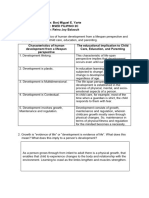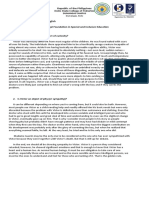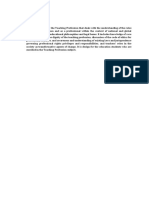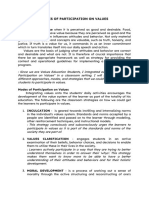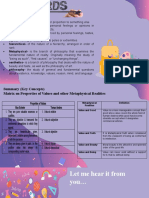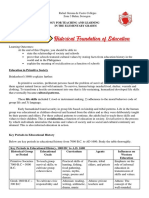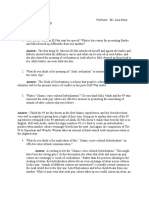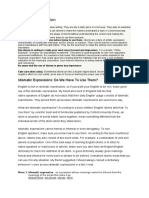Character As Moral Creativity
Character As Moral Creativity
Uploaded by
Unalyn UngriaCopyright:
Available Formats
Character As Moral Creativity
Character As Moral Creativity
Uploaded by
Unalyn UngriaOriginal Title
Copyright
Available Formats
Share this document
Did you find this document useful?
Is this content inappropriate?
Copyright:
Available Formats
Character As Moral Creativity
Character As Moral Creativity
Uploaded by
Unalyn UngriaCopyright:
Available Formats
Character as Moral Creativity
Thinkers do not agree as to how much of personality is inherited from
parents or from environment. But they agree that character is the will of the
individual to direct hi effort towards a recognized ideal. In this sense, character
is a creative process of developing one self, not necessarily according to socially
acceptable norms, but according to a set of recognized ideals. In history, men
considered great in character are often nonconformist, acting against the
prevailing beliefs and practices of the day. Such were Christ, Sakya-Muni or
Buddha, Gandhi, Martin Luther King and many others.
Character is the process of becoming man, by unfolding the innate
goodness of human nature. It is a conscious effort to grow “in age and
wisdom”. Character is not the result of good act done in a moment of
inspiration. Character is the habit of doing well at all time. (Agapay)
Human Habits
Man is a creature of habits. He is born with a wide assortment of powers
that open up limitless horizons for development. Reason stands at the apex of
the vast array of potentialities. Man if he must integrate all his powers in one
wholesome personality, must rely on the power of reason. Man must form the
habit of reason.
Habit comes from the Latin word “habere”, meaning “to have”. Habit is
either the disposition to have something, or the disposition to act in a certain
manner. The first is called “entitative habit”, that which disposes a thing to
have a certain nature or quality of being, such as to be beautiful, talented, or
to be obese. The latter is called “operative habit”, that which disposes for
doing something in a certain manner, such as painting, writing, or talking. We
are primarily interested with operative habits, They may be defined as the
readiness to do something.(Agapay)
You might also like
- Activity 1Document5 pagesActivity 1Borj YarteNo ratings yet
- Uts Chap 8 PDFDocument4 pagesUts Chap 8 PDFAngel SantiagoNo ratings yet
- Purposive Communication OverviewDocument4 pagesPurposive Communication OverviewLineClar RealNo ratings yet
- RESERACHDocument3 pagesRESERACHKaycee Fernandez ViernesNo ratings yet
- Lesson 5: Moral DevelopmentDocument14 pagesLesson 5: Moral DevelopmentManiya Dianne ReyesNo ratings yet
- Chap.2Lesson2 Balindan Roxan MaeDocument5 pagesChap.2Lesson2 Balindan Roxan MaeRoxan Mae BalindanNo ratings yet
- Nocebo JeaneDocument10 pagesNocebo Jeanejeanemariemadrazo50No ratings yet
- Gec 1 Chapter 2Document27 pagesGec 1 Chapter 2Ethan VercoloNo ratings yet
- Entrep Week 1 Mod 1Document5 pagesEntrep Week 1 Mod 1rjayrjayNo ratings yet
- Local Media5159404002847715202Document58 pagesLocal Media5159404002847715202Kanao TsuyuriNo ratings yet
- Dusaban Topic 1Document5 pagesDusaban Topic 1Nix AmrNo ratings yet
- Prof Ed 1teaching Profession 1Document91 pagesProf Ed 1teaching Profession 1DELA CRUZ, SHANE MARWIN P.No ratings yet
- ED101 CALLP MT4 Social and Emotional DevelopmentDocument42 pagesED101 CALLP MT4 Social and Emotional DevelopmentIt's AlfredNo ratings yet
- CHAPTER 4 - Developmental Theories and Other Relevant TheoriesDocument6 pagesCHAPTER 4 - Developmental Theories and Other Relevant TheoriesEricaNo ratings yet
- Modes of Participation On ValuesDocument2 pagesModes of Participation On ValuesSamher Adriane Idaniol100% (1)
- Citizenship Attitude BuildingDocument7 pagesCitizenship Attitude BuildingRaya MadriagaNo ratings yet
- Lesson 2 Metaphysical RealitiesDocument24 pagesLesson 2 Metaphysical RealitiesJennifer Oriola100% (1)
- Turo NG Mga Mag Aaral Na May Espesyal Na PangangailanganDocument9 pagesTuro NG Mga Mag Aaral Na May Espesyal Na Pangangailanganrealjosalyncastillo2No ratings yet
- Part 2 Module Final The Professional Teachers Are Com 2Document26 pagesPart 2 Module Final The Professional Teachers Are Com 2Just HezekiahNo ratings yet
- The Contemporary WorldDocument17 pagesThe Contemporary WorldNoah R. LobitanaNo ratings yet
- Globalization: Impact On Society and CultureDocument21 pagesGlobalization: Impact On Society and CulturePre Loved OlshoppeNo ratings yet
- GE 2 Midterm Exam ReviewerDocument3 pagesGE 2 Midterm Exam ReviewerBrylle RoderosNo ratings yet
- Uts Module 4Document8 pagesUts Module 4Chen HaoNo ratings yet
- Lesson 2Document25 pagesLesson 2Michelle Gutierrez SibayanNo ratings yet
- Prof Ed 2 Chapter 2Document7 pagesProf Ed 2 Chapter 2John Paul Guim GalillagaNo ratings yet
- Module 1 PhilosophicalDocument15 pagesModule 1 PhilosophicalAmy CerdaNo ratings yet
- Notes in Ge 5 - Purposive Communication Project Proposal - Use IMRAD Note - TakingDocument6 pagesNotes in Ge 5 - Purposive Communication Project Proposal - Use IMRAD Note - TakingLey DoydoraNo ratings yet
- Module 9 The Spiritual SelfDocument12 pagesModule 9 The Spiritual SelfrosellepalacioramaNo ratings yet
- Embodied Spirit by Jose CalasanzDocument9 pagesEmbodied Spirit by Jose CalasanzJJ ArabiaNo ratings yet
- EthicsDocument13 pagesEthicsVinnese Rile Balataria SecuyaNo ratings yet
- Ed 101 Part 2Document67 pagesEd 101 Part 2Dyhane Faith ArbuesNo ratings yet
- COLLEGE UneducationDocument5 pagesCOLLEGE UneducationPatrick Galang100% (3)
- The Self From Various PerspectivesDocument51 pagesThe Self From Various PerspectivesChang ChangNo ratings yet
- Rizal Technological University: College of EducationDocument2 pagesRizal Technological University: College of EducationRaymart EstavilloNo ratings yet
- Uts Notes Week 7Document2 pagesUts Notes Week 7Jay Banal100% (1)
- Filipino Compose RDocument10 pagesFilipino Compose RmngpadillaNo ratings yet
- Political Self UtsDocument13 pagesPolitical Self UtsJinken Shane SalvatierraNo ratings yet
- Key Periods in Educational HistoryDocument4 pagesKey Periods in Educational HistoryHarvey Marmol LopezNo ratings yet
- What Is A ParadigmDocument2 pagesWhat Is A ParadigmCristian AsmazaNo ratings yet
- Social Conditioning Theory: Title: Culture in Moral BehaviourDocument3 pagesSocial Conditioning Theory: Title: Culture in Moral BehaviourCarissa Faye SantiagoNo ratings yet
- P.E Module 3Document5 pagesP.E Module 3Joyce EstrellaNo ratings yet
- Philosophical PerspectiveDocument27 pagesPhilosophical PerspectiveAilen Begino100% (1)
- EDUC 70 Module 1Document6 pagesEDUC 70 Module 1Leslie mae GioNo ratings yet
- Compound Words in FilipinoDocument1 pageCompound Words in FilipinoLeopoldo Jr LasetNo ratings yet
- Activity 1: Name: Gabat, Devine Grace C. Course: Bee-Ege 2-1Document3 pagesActivity 1: Name: Gabat, Devine Grace C. Course: Bee-Ege 2-1Devine Gabat100% (1)
- Assignment Oct 1Document2 pagesAssignment Oct 1JESSALYN ESGUERRANo ratings yet
- Educ 1 - Chapter 1Document21 pagesEduc 1 - Chapter 1Samyjane Alvarez100% (1)
- The Self in Western and Eastern ThoughtDocument18 pagesThe Self in Western and Eastern ThoughtYeho ShuaNo ratings yet
- Role of Culture in Our Understanding of "Body Image" and "Self-Esteem"Document11 pagesRole of Culture in Our Understanding of "Body Image" and "Self-Esteem"Kenneth Ocfemia BanzuelaNo ratings yet
- Uts C-1 - 4Document7 pagesUts C-1 - 4Darioz Basanez LuceroNo ratings yet
- Literature Review Non-Verbal CommunicationDocument17 pagesLiterature Review Non-Verbal CommunicationMacky BautistaNo ratings yet
- Political SelfDocument8 pagesPolitical SelfFRANC MELAN TANAY LANDONG100% (1)
- Section 2 RizalDocument5 pagesSection 2 RizalJUDE VINCENT MACALOSNo ratings yet
- m1 Lesson 1 Social Science Understanding SelfDocument63 pagesm1 Lesson 1 Social Science Understanding Selfshairyn AmonoyNo ratings yet
- Ling 1 Module Number 1Document10 pagesLing 1 Module Number 1Jean Claude CagasNo ratings yet
- Educ 9Document22 pagesEduc 9d o sNo ratings yet
- Prof. Ed. 1 Module 2Document12 pagesProf. Ed. 1 Module 2Alyssa May Tabinas OxinaNo ratings yet
- My Life Journey Through . . . with God: Reality and Facts of Life!From EverandMy Life Journey Through . . . with God: Reality and Facts of Life!No ratings yet
- Ungria, Unalyn D. - Edu 107 - Photo EssayDocument3 pagesUngria, Unalyn D. - Edu 107 - Photo EssayUnalyn UngriaNo ratings yet
- Teaching ProfessionDocument9 pagesTeaching ProfessionUnalyn UngriaNo ratings yet
- Idiomatic ExpressionDocument9 pagesIdiomatic ExpressionUnalyn UngriaNo ratings yet
- Noun PhraseDocument20 pagesNoun PhraseUnalyn UngriaNo ratings yet
- Human Person As Moral AgentDocument1 pageHuman Person As Moral AgentUnalyn UngriaNo ratings yet
- Moral Virtues: 3. Temperance Is The Virtue Which Helps Us Regulate Our Passion and OurDocument1 pageMoral Virtues: 3. Temperance Is The Virtue Which Helps Us Regulate Our Passion and OurUnalyn UngriaNo ratings yet
- Man As PersonDocument1 pageMan As PersonUnalyn UngriaNo ratings yet
- Attitudinal Level. This Refers To The Mental Reaction of Every Man To ADocument1 pageAttitudinal Level. This Refers To The Mental Reaction of Every Man To AUnalyn UngriaNo ratings yet
- What Are The Things That Cause You To Lie To Others? 5 PtsDocument1 pageWhat Are The Things That Cause You To Lie To Others? 5 PtsUnalyn UngriaNo ratings yet
